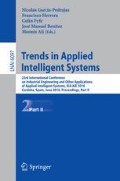Abstract
Recently, a semantic interpretability index has been proposed to preserve the semantic interpretability of Fuzzy Rule-Based Systems while a tuning of the membership functions is performed. In this work, we extend the proposed multi-objective evolutionary algorithm in order to analyze the performance of the tuning based on this semantic interpretability index while it is combined with a rule selection. To this end, the following three objectives have been considered: error and complexity minimization, and semantic interpretability maximization.
The analyzed method is compared to a single objective algorithm and to the previous approach in two problems showing that many solutions in the Pareto front dominate to those obtained by these methods.
Supported by the Spanish Ministry of Education and Science under grant no. TIN2008-06681-C06-01.
Access this chapter
Tax calculation will be finalised at checkout
Purchases are for personal use only
Preview
Unable to display preview. Download preview PDF.
References
Casillas, J., Cordón, O., Herrera, F., Magdalena, L. (eds.): Interpretability issues in fuzzy modeling. Studies in Fuzz. and Soft Comp, vol. 128. Springer, Heidelberg (2003)
Alcalá, R., Gacto, M.J., Herrera, F., Alcalá-Fdez, J.: A multi-objective genetic algorithm for tuning and rule selection to obtain accurate and compact linguistic fuzzy rule-based systems. International Journal of Uncertainty, Fuzziness and Knowledge-Based Systems 15(5), 539–557 (2007)
Alonso, J.M., Magdalena, L., Guillaume, S.: Hilk: A new methodology for designing highly interpretable linguistic knowledge bases using the fuzzy logic formalism. International Journal of Intelligent Systems 23(7), 761–794 (2008)
Ishibuchi, H., Nojima, Y.: Analysis of interpretability-accuracy tradeoff of fuzzy systems by multiobjective fuzzy genetics-based machine learning. International Journal of Approximate Reasoning 44(1), 4–31 (2007)
Botta, A., Lazzerini, B., Marcelloni, F., Stefanescu, D.C.: Context adaptation of fuzzy systems through a multi-objective evolutionary approach based on a novel interpretability index. Soft Computing 13(5), 437–449 (2008)
de Oliveira, J.V.: Towards neuro-linguistic modeling: constraints for optimization of membership functions. Fuzzy Sets and Systems 106(3), 357–380 (1999)
Gacto, M.J., Alcalá, R., Herrera, F.: A multiobjective evolutionary algorithm for tuning fuzzy rule based systems with measures for preserving interpretability. In: Proc. of the Joint IFSA World Congress and EUSFLAT Conference, Lisbon, Portugal, pp. 1146–1151 (2009)
Herrera, F., Lozano, M., Verdegay, J.L.: Tuning fuzzy logic controllers by genetic algorithms. International J. of Approximate Reasoning 12, 299–315 (1995)
Karr, C.: Genetic algorithms for fuzzy controllers. AI Expert 6(2), 26–33 (1991)
Coello, C.A., Veldhuizen, D.A.V., Lamont, G.B. (eds.): Evolutionary algorithms for solving multi-objective problems. Kluwer Academic Publishers, Dordrecht (2002)
Deb, K.: Multi-objective optimization using evolutionary algorithms. John Wiley & Sons, NY (2001)
Zitzler, E., Laumanns, M., Thiele, L.: Spea2: Improving the strength pareto evolutionary algorithm for multiobjective optimization. In: Proc. Evolutionary Methods for Design, Optimization and Control with App. to Industrial Problems, Barcelona, Spain, pp. 95–100 (2001)
Casillas, J., Cordón, O., Jesus, M.J.D., Herrera, F.: Genetic tuning of fuzzy rule deep structures preserving interpretability and its interaction with fuzzy rule set reduction. IEEE Trans. Fuzzy Syst. 13(1), 13–29 (2005)
Bodenhofer, U., Bauer, P.: A formal model of interpretability of linguistic variables. In: [1], pp. 524–545
Espinosa, J., Vandewalle, J.: Constructing fuzzy models with linguistic integrity from numerical data-AFRELI algorithm. IEEE Trans. Fuzzy Syst. 8(5), 591–600 (2000)
Eshelman, L.J.: The CHC adaptive search algorithm: How to have safe search when engaging in nontraditional genetic recombination. In: Rawlin, G. (ed.) Foundations of genetic Algorithms, vol. 1, pp. 265–283. Morgan Kaufman, San Francisco (1991)
Eshelman, L.J., Schaffer, J.D.: Real-coded genetic algorithms and interval-schemata. Foundations of Genetic Algorithms 2, 187–202 (1993)
Wang, L.X., Mendel, J.M.: Generating fuzzy rules by learning from examples. IEEE Trans. Syst., Man, Cybern. 22(6), 1414–1427 (1992)
Author information
Authors and Affiliations
Editor information
Editors and Affiliations
Rights and permissions
Copyright information
© 2010 Springer-Verlag Berlin Heidelberg
About this paper
Cite this paper
Gacto, M.J., Alcalá, R., Herrera, F. (2010). Analysis of the Performance of a Semantic Interpretability-Based Tuning and Rule Selection of Fuzzy Rule-Based Systems by Means of a Multi-Objective Evolutionary Algorithm. In: García-Pedrajas, N., Herrera, F., Fyfe, C., Benítez, J.M., Ali, M. (eds) Trends in Applied Intelligent Systems. IEA/AIE 2010. Lecture Notes in Computer Science(), vol 6097. Springer, Berlin, Heidelberg. https://doi.org/10.1007/978-3-642-13025-0_25
Download citation
DOI: https://doi.org/10.1007/978-3-642-13025-0_25
Publisher Name: Springer, Berlin, Heidelberg
Print ISBN: 978-3-642-13024-3
Online ISBN: 978-3-642-13025-0
eBook Packages: Computer ScienceComputer Science (R0)

